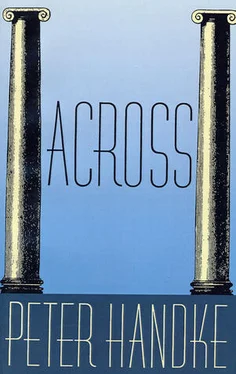Peter Handke - Across
Здесь есть возможность читать онлайн «Peter Handke - Across» весь текст электронной книги совершенно бесплатно (целиком полную версию без сокращений). В некоторых случаях можно слушать аудио, скачать через торрент в формате fb2 и присутствует краткое содержание. Год выпуска: 2000, Издательство: Farrar, Straus and Giroux, Жанр: Современная проза, на английском языке. Описание произведения, (предисловие) а так же отзывы посетителей доступны на портале библиотеки ЛибКат.
- Название:Across
- Автор:
- Издательство:Farrar, Straus and Giroux
- Жанр:
- Год:2000
- ISBN:нет данных
- Рейтинг книги:3 / 5. Голосов: 1
-
Избранное:Добавить в избранное
- Отзывы:
-
Ваша оценка:
- 60
- 1
- 2
- 3
- 4
- 5
Across: краткое содержание, описание и аннотация
Предлагаем к чтению аннотацию, описание, краткое содержание или предисловие (зависит от того, что написал сам автор книги «Across»). Если вы не нашли необходимую информацию о книге — напишите в комментариях, мы постараемся отыскать её.
Across — читать онлайн бесплатно полную книгу (весь текст) целиком
Ниже представлен текст книги, разбитый по страницам. Система сохранения места последней прочитанной страницы, позволяет с удобством читать онлайн бесплатно книгу «Across», без необходимости каждый раз заново искать на чём Вы остановились. Поставьте закладку, и сможете в любой момент перейти на страницу, на которой закончили чтение.
Интервал:
Закладка:
On the sloping meadows above the stairs — the archers now inaudible — the densely growing dandelions, interlocking like small cogwheels, had closed with the onset of twilight, and their diurnal yellow gave way to the dark enamel-yellow of the buttercups (more thinly spread, because the flowers were so tiny) on their tall, thin, ramified stems, which, though there was hardly any wind, swayed all along the slope, accentuating the “evening” character of the scene. On this part of the mountain, the rock is almost everywhere covered by grass, but the green in every rib, bend, groove, and crevice brings out the rock shapes all the more strikingly. The only tree on the long slope, almost at the top, is an elder (ordinarily a mere bush) with a thick trunk, which, though steeply inclined, is clearly in no danger of falling. Ring after ring of branches sweep upward in ever-new impulsions, and the whole tree stands against the background of the sky as though ready to take off. In passing, I saw here and there in the forks of the branches something resembling eyes (just as trees are improved by having the buds, or “eyes,” of other varieties grafted onto them). These were the light-colored heads of the titmice that spend the night in this elder. As, climbing higher, I looked back over my shoulder, the grounds of the provincial hospital came into view. A white helicopter pattern had been painted on an illuminated circle of concrete, and just then a real helicopter was landing, while at the edge of the circle an ambulance stood ready, with a stretcher protruding from the open rear door. Through the great doorway fronting on the road, a late visitor was stepping out into the open. In the stairwell of one section, as in certain hotels, nets were stretched out, which were supposed to stop patients from jumping over the banisters and into the lobby. “We wouldn’t want to die in there, would we?” I heard a passerby saying; by then, it had grown so dark on the mountain that the speaker was faceless.
From here, the slope descends into a deep bowl, suggesting a doline caused by the collapse of an underground cavern. One side of the bowl is almost vertical, and here the rock, a peculiarity of this bit of meadow, forms a high, naked wall. The bottom of the bowl is sheltered from the wind and the wall is dotted with niches, where the homeless take shelter. In one of these recesses, two figures sat huddled, covered up to their necks with a plastic poncho. A little wood fire lit up their faces. They were a man and a woman, gray-haired and gray-skinned, shoulder to shoulder. There were bottles of liquor on the stone shelf level with their heads, but neither reached for them. They scarcely moved; and when they did move, it was with strange, indecipherable jerks, like creatures out of another geological era. Yet, though they turned not toward each other but toward the fire, they were talking. Noting the observer up at the edge of the bowl, they fell silent and stared at me, motionless, poised for action. They wouldn’t do anything, and yet, just with that glance, something had happened between us. Was it only a joke that when I continued on my way a woman coming toward me in the next circle of light cried out: “Help!”
The circle of light did not belong to a streetlamp; it came from the open door of the dormitory at the edge of the clearing; after the vegetable garden behind it, the forest begins again. This dormitory is several stories high; there, at the brow of that primordial hollow, it almost puts one in mind of a skyscraper. Next to it is a smaller service building, with the kitchen and dining room on the ground floor. The path passes between the two buildings. In the dining room, a boy was sitting alone, waiting for his dinner; in the kitchen, a white-clad kitchen maid was ladling soup into his bowl from an enormous caldron. Nearly all the other students must have gone away for the Easter holidays; only a single room in the building was lit; on top of the clothes cupboard, a suitcase; down in the entrance hall, a bicycle with a soccer ball on its baggage rack. The student did not look up when the maid set the soup down in front of him. After the meal, he brought his dishes back to the kitchen and slowly drank a glass of water.
Up on the ridge road, by the streetlamps, I saw two deep-black angled lines on the trunk of a beech tree. They couldn’t have been there on my way out; this war paint on the smooth, light-gray bark could not have escaped me. I thought only: Now! Then I bent over, picked up a stone, and set out at a run. Beside a breach in an old battlement, I saw another black spot, even larger than the one on the tree trunk; the paint — I touched it in passing — wasn’t dry yet. Could it be that what drove me on was not the fact that they were swastikas? After all, one often comes across swastikas, and not just in this country; and besides, in my excavation work I had seen any number of old artworks in which this symbol has a perfectly innocent meaning or is used as a mere ornament. I recall, for instance, an early Christian mosaic floor in which cranes are carrying swastikas in their beaks. Could, then, this freshly sprayed sign be a symbol of peace? No, a swastika is a swastika. And this sign, this negative image, symbolized the cause of all my melancholy — of all melancholy, ill humor, and false laughter in this country. And this accursed mark had not just been daubed on out of caprice or thoughtlessness; it had been traced with malignant precision and black determination, laid on thickly and thoroughly; the exaggerated hooks were intended to threaten evil, to hit the viewer full in the face; and indeed, they did hit me full in the face. Me? I? One great burst of passion.
In running, I felt an unaccustomed impersonal strength, which, however, did not emanate from the stone in my hand. The very teeth in my mouth became a weapon. On the narrowest part of the mountain, where it tapers down to little more than a crest, a woman in a fur coat was standing by the rail at the edge of the cliff. The streets of the Old City down below were recognizable only by the narrow, reddish trails of light between the dark, almost deserted buildings. In the darkness, the illumined twin steeples of the Kollegienkirche, which, with the rings of light-colored stone figures on their flat roofs, resemble castles on a chessboard by day, became grimacing Indian idols; the clocks became eye sockets, the window ledges bulging foreheads, and the rings of statues flaming hair. The most tranquil and at the same time the most powerful lights in the city were the rows of reddish-yellow lamps on the railroad-station platforms. Reflected in the water, the cars on the river bridges became vastly magnified shadow caravans without beginning or end. Two crossed overhead bus wires hissed like a whiplash through the deserted city squares.
Nothing escaped my notice as I ran. In passing, I kicked a paper carton with some French-fried potatoes left in it off the path (a McDonald’s has recently opened on Getreidegasse, the Old City Commission has commended its façade for blending harmoniously with the neighboring buildings; a lot of the young people, including my children, meet there). A hedgehog, dark legs, black snout, shining little eyes, dug itself out of a pile of leaves — no doubt it had just awakened from its winter sleep — and then swam seal-like through the mass of foliage, heading for the woods. In places, especially noticeable to the runner, the mountaintop was immersed in exhaust fumes from the ventilation shafts of the garages built into the rock below. On a dwarf tree, a mere pole split down the middle, sat an enormous owl, within reach of the road; it did not take flight at my approach, but fluffed up its feathers, turned its head toward me, and followed me with its round eyes.
At its apex, the road passes between two long walls of rock. At one point, the gully thus formed was not “empty,” or so it seemed to me as I ran. My eye fell first on a spray can (the word “bomb” rose to my mind), then on the finger on the button, and last on the figure attached to it. The figure had no contours, but immediately had a name: the name given, in a purportedly faithful Bible translation, to “the evil one”—the Frustator. Time and again, one meets with hostile faces, but the Frustator, the archenemy, is faceless. Up until then, I had often had intimations of his presence, though always in a crowd, in passing: a grotesquely supple thumb joint; the chalk-white interior of a mouth; a bare foot shaped like a crocodile; an eye from which all color seemed to have drained; a neck swollen from blowing into a police whistle. But here at last I saw him as a whole, not in a crowd, but alone.
Читать дальшеИнтервал:
Закладка:
Похожие книги на «Across»
Представляем Вашему вниманию похожие книги на «Across» списком для выбора. Мы отобрали схожую по названию и смыслу литературу в надежде предоставить читателям больше вариантов отыскать новые, интересные, ещё непрочитанные произведения.
Обсуждение, отзывы о книге «Across» и просто собственные мнения читателей. Оставьте ваши комментарии, напишите, что Вы думаете о произведении, его смысле или главных героях. Укажите что конкретно понравилось, а что нет, и почему Вы так считаете.












